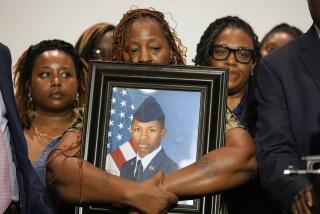â60s Radical Draws Life in Killing of Deputy
ATLANTA â Jamil Abdullah Al-Amin, the 1960s black-power activist formerly known as H. Rap Brown, was sentenced to life in prison without parole Wednesday for killing a deputy sheriff who tried to serve him a warrant two years ago.
Al-Amin, 58, a Muslim cleric who in recent years led programs to combat drugs and poverty in his West End neighborhood, showed no emotion when the punishment was read. Later he turned and greeted family members in the courtroom with a quick wave and a smile. The prosecution had asked for the death penalty.
A generation ago, when Brown registered voters in Alabama and stirred a riotous crowd in Cambridge, Md., with the words, âIf America donât come around, we will burn America down,â a sentence such as Wednesdayâs might have been racially divisive. But Al-Aminâs defense elicited little sympathy in the black community.
The indifference is a measure, at least in part, of the great changes that have swept over Atlanta since the turbulent 1960s. It is a city where the mayor, police chief, district attorney and county sheriff are black. The deputy Al-Amin killed was black. And the jury that convicted Al-Amin on Saturday of murder and rendered his sentence Wednesday was composed of nine blacks, two whites and one Latino.
Al-Amin did not testify in his own defense at the trial, but 17 character witnesses--including former Atlanta Mayor Andrew Young, now 70 and a business consultant, and former Black Panther Kathleen Cleaver, an Emory University law professor--spoke in his behalf. Young, who said he knew Al-Amin before he converted to Islam in prison and changed his name, called the defendant a âpeaceful man.â
The murder occurred March 16, 2000, when deputies Ricky Kinchen, 35, and Aldranon English, 28, stopped Al-Amin near the West End grocery store he ran. The officers were trying to serve him with an arrest warrant for missing a court date related to charges of receiving stolen property, driving without proof of insurance and impersonating a police officer.
English testified that he told Al-Amin to put his right hand in view. The deputy went on: âHe said, âYeah,â frowned and swung up an assault rifle and started shooting.â English was wounded in his legs, left arm and chest. Kinchen was hit in the abdomen and died the next day.
Security was extraordinarily tight during Al-Aminâs trial and sentencing, with at least half a dozen plainclothes security officers in the courtroom watching the spectators, which included Kinchenâs widow and family, and members of the Islamic community.
The red-bearded Al-Amin, wearing large glasses and a clericâs white cap and robe, sat quietly and calmly throughout the trial, occasionally shaking his head at something a witness would say. The defense rested its case after two days of testimony, surprising many who had expected numerous witnesses would be called over several weeks to support Al-Aminâs contention that he was a victim of mistaken identity.
More to Read
Sign up for Essential California
The most important California stories and recommendations in your inbox every morning.
You may occasionally receive promotional content from the Los Angeles Times.









